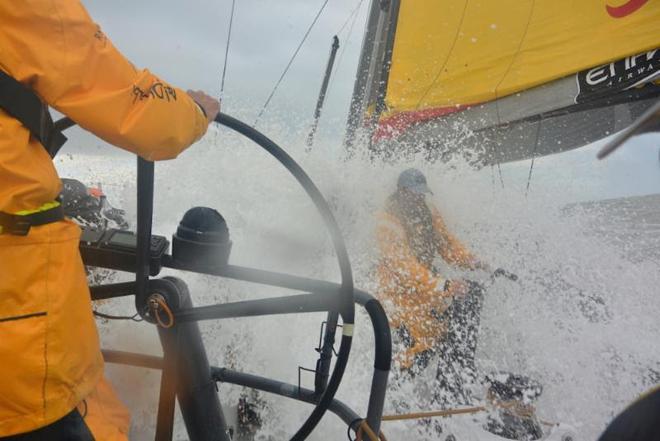Volvo Ocean Race - The Doldrums, a navigational nightmare + Video
by Jonno Turner on 21 Oct 2014

Onboard Azzam Justin Chisholm / Abu Dhabi Ocean Racing
http://www.volvooceanrace.com
Volvo Ocean Race 2014-15. The sun’s out. It’s warm – not too hot, but warm enough for just a tee shirt.
Ian Walker is stood at the helm of his Emirati boat, generous Atlantic trade winds whistling past his ears.
'We’re going straight through,' he claims, confidently. 'What Doldrums? - they’re going to say. Azzam isn’t even going to slow down.'
It’s a bold and brash statement, and the flicker of doubt behind the skipper’s eyes suggests that its one he might still be trying to convince himself of.
A broken mast meant that his boat didn’t have to jump this hurdle last edition – but the truth is that, no matter how experienced or sea-worn they are, no-one can truly prepare for what the fleet will encounter over the next 24 hours.
Fickle winds coming and going, tropical rain spilling and stuttering from clouds as wide as cities, thunderstorms and hurricanes cracking and warping the skyline – a navigational nightmare awaits.
For hundreds of years, the doldrums, a name given to the regions of light converging winds and calm seas surrounding the Equator, and stretching around 250nm between 2° north and 8° north, has tormented and teased sailors, and there’s one thing for sure – it won’t stop now.
'The reality is that if you’re 60% right on the clouds, then you’re doing well,' admits Team Alvimedica navigator Will Oxley.
'Some of the clouds are 80 miles across. It’s about more than just luck, but not much.'
The oldest member of the youngest team in the race, this will be the Australian Marine Biologist’s 14th time crossing the Equator, and he knows just how key the next couple of days could be in the race to Cape Town – especially for the newbies.
'I guess you do have to prepare psychologically. You can easily win or lose 50 miles. I’m more relaxed as I know how random it can be.'
In centuries past, sailors stranded in the stagnant waters of the doldrums were anything but relaxed. Delerium, starvation and cabin fever were all within touching distance.
With supplies running low, and scurvy setting in, getting through this mysterious patch of Atlantic Ocean quickly wasn’t just a matter of first or last place, but life and death.
And even in the 21st century, it’s not easy to get used to Mother Nature mocking you.
'Will seems perfectly at grips with the reality of the region,' writes Team Alvimedica’s Onboard Reporter Amory Ross, on the difference between how his navigator and skipper, Charlie Enright, are handling the unstable conditions.
'But for Charlie, you can already sense a bit of frustration at seeing big differences between the weather routing software, and what we’re actually experiencing on deck.'
Amory continues. 'He’s starting to understand that much of the next week’s tactics will be made by looking skyward towards the clouds, rather than down below at the nav station.'
Back on Abu Dhabi Ocean Racing, Onboard Reporter Matt Knighton picks up the story – and suggests that Ian might be a little more nervous about the next few days than he lets on.
'The veterans onboard know the race could restart once we’re all parked up in the light winds ahead of us,' he writes.
'Floorboards are getting cleaned, batteries charged, and old musty food that made its way to the bottom of the food bags is being tossed.'
His skipper finally cracks a smile, and admits, 'It’s a little bit of skill, a fair bit of luck, and can be frustrating. But hopefully it’ll go well for us.'
Team Brunel head into the doldrums in the most westerly position, and their navigator Andrew Cape, who has notched up five Volvos already, explained that choice.
'Every race is different,' he says. 'We perceive this to be the fastest way, but it’s a game. It’s a gamble.'
'You have to work your way around the clouds you get dealt, and negotiate them – it’s never simple.'
Race meteorology expert Gonzalo Infante believes that the Dutch boat could be in an advantageous position heading into the convergence zone.
'Historically, the more west you are, the better, as there tends to be more wind there,' he says.
'But, alternatively, if a boat can successfully cross in a more easterly position, then they would benefit from a much better angle as they head to the Fernando de Noronha waypoint.'
With the fleet in a line, sailing in similar wind conditions, and set to enter the doldrums later on tonight, does Will have any advice for those who’ve never been there before?
'Be prepared, is my advice. They’re all telling me to get more sleep - I think they reckon I might be useful!' Volvo Ocean Race
If you want to link to this article then please use this URL: www.sail-world.com/127995